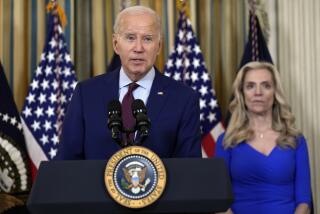Obama administration retreats on key part of proposed financial overhaul
WASHINGTON — Lawmakers began an intensive push to pass the most sweeping revision of financial regulations since the Great Depression, but the Obama administration’s proposed overhaul might undergo an overhaul itself along the way.
The congressional committee chairmen handling the administration’s 600-page proposal weighed in this week with significant changes as they tried to meet the president’s deadline for action by the end of the year.
On Wednesday, Treasury Secretary Timothy F. Geithner backed down on a key component that has stirred opposition -- a requirement that companies providing financial products offer a “plain vanilla” option, such as fixed-rate mortgages or no-frills credit cards.
His retreat came after Rep. Barney Frank (D-Mass.), chairman of the House Financial Services Committee, floated details of his own version of regulatory legislation that eliminated the requirement.
Geithner’s move showed that, just as with healthcare legislation, the administration is willing to accept significant revisions to get its plan passed.
“As the president likes to say, we don’t have a monopoly of wisdom on these things,” Geithner told Frank’s committee, adding that the administration was generally “very supportive” of the changes. “Our test is, what is going to work?”
Congressional and industry leaders now expect significant revisions to be made to the administration’s plan. However, any bill is still likely to contain key components that give the government greater power to oversee the financial system for major risks, a new ability to seize and dismantle large financial institutions, and the authority to create a new agency to look out for consumer interests.
“I think there’s still more changes to come,” said Scott Talbott, the chief lobbyist for the Financial Services Roundtable, which represents large financial institutions.
The industry has objected strongly to parts of Obama’s plan, particularly the creation of a Consumer Financial Protection Agency to be the people’s watchdog over financial products that companies offer.
Frank, promising to push forward aggressively, has scheduled 11 hearings through early next month and said the House would vote in November on the legislation his committee produces. After discussions this week with Senate Banking Committee Chairman Christopher J. Dodd (D-Conn.), Frank said he expected the Senate to act this year as well.
Obama used a major speech last week on Wall Street to try to jump-start momentum for his regulatory overhaul, which was unveiled in June. On Wednesday, Geithner warned lawmakers who wanted to take more time to consider proposals that “it’s a huge risk” to put off the legislation.
Dodd, who is drafting his own legislation, said he would propose a major departure from the administration plan -- merging the four existing bank regulatory agencies into a single national bank regulator. The Obama plan did not go so far in that regard, proposing only to merge two of the agencies, the Office of Thrift Supervision and the Office of the Comptroller of the Currency.
Dodd and Frank are strong supporters of a consumer agency that would have the ability to draft rules as well as inspect financial institutions for compliance. The heads of the OTS, the OCC and the Federal Deposit Insurance Corp. reiterated their opposition Wednesday to a provision that would move consumer enforcement powers from them to the new agency.
“We care about consumer protection,” said FDIC Chairwoman Sheila C. Bair.
In a two-page memo this week, Frank offered several changes for the consumer agency. He would eliminate the plain-vanilla requirement for financial products, which has drawn criticism because the government would dictate what products companies could offer.
Frank also wants to exempt nonfinancial businesses from the agency’s oversight even if they offer financial products. That would include retailers who have credit or layaway plans and auto dealers who offer loans to buy vehicles.
Even with those changes, the Financial Services Roundtable and the U.S. Chamber of Commerce said they still opposed creating the agency.
Frank also said it was crucial to deal with institutions deemed “too big to fail.” The administration wants tougher oversight and the ability to seize and dismantle them if they’re on the verge of collapse. Regulators now can do that with banks, but not with other financial institutions such as insurance companies.
Frank opposed the administration’s plan to identify those firms, which some argue would imply the government’s willingness to bail them out. Geithner said the firms would be held to tougher standards to reduce risk, such as keeping a larger amount of money in reserve to handle losses, and that would be impossible to do without identifying them.
“But you have to do it in a way that doesn’t . . . create an expectation that the government will be in there if they fail,” Geithner said.
--
More to Read
Get the L.A. Times Politics newsletter
Deeply reported insights into legislation, politics and policy from Sacramento, Washington and beyond. In your inbox three times per week.
You may occasionally receive promotional content from the Los Angeles Times.











